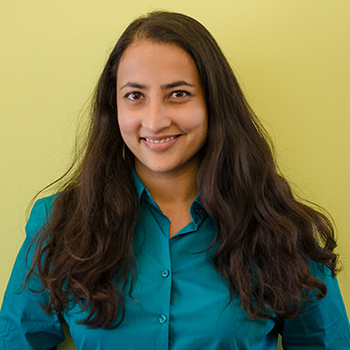Shreya Saxena: At the Intersection of Neuroscience, Artificial Intelligence, and Control Theory
Yale Engineering is proud to welcome its newest faculty for the 2023-24 academic year. These six new faculty members – with more to be announced soon – mark the continued growth of the School and investment in the research areas illustrated in the SEAS Strategic Vision.
The latest faculty arrivals are valuable additions to the applied physics, biomedical, and mechanical engineering and materials science departments. Their expertise includes machine learning, artificial intelligence, atomic engineering, quantum computing, photon physics, neuroscience, and biological networks.
Upon their arrival, we asked these new faculty members questions about their work, their motivations, potential collaborations, and much more:

Shreya Saxena, Biomedical Engineering
Hometown?
I am a nomad. I was born in New Delhi (India) and moved to Geneva (Switzerland) at the age of 11. I moved to the U.S. for graduate school; thus far, I have lived in Baltimore, Boston, New York City, and finally in Gainesville, FL. However, I have spent the longest amount of time in the Northeast of the U.S. Now, I feel like I’m coming back home
Prior academic history?
I am truly interdisciplinary: my Bachelor’s degree is in Mechanical Engineering from EPFL, my Masters’ in Biomedical Engineering from Johns Hopkins University, and my PhD in Electrical Engineering and Computer Sciences from MIT. My postdoc was in the Department of Statistics and the Center for Theoretical Neuroscience at the Zuckerman Mind Brain Behavior Institute at Columbia University.
How would you summarize your research?
My lab is interested in the intersection between neuroscience, artificial intelligence, and control theory. This includes computational modeling of neural circuits involved in sensorimotor control, decision-making, learning multiple tasks, as well as modeling complex behavior. We are very collaborative and data-driven.
What inspired you to choose this field of study?
When I was halfway through my undergraduate degree in Mechanical Engineering, I became quite disheartened by the study of lawnmowers and drills. At this point, I happened to attend a lecture by Henry Markram, a renowned neuroscientist at EPFL, who gave an inspiring seminar about how little we know about our own bodies, and how much computational modeling can really help decipher or ‘reverse engineer’ the brain, the computational center of how we process information and make actions. I went on to do an undergraduate research stint at the Blue Brain Project at EPFL, and became enthralled by the idea of combining engineering principles I had learnt in the classroom to the wonderfully complex problem of modeling the brain, and never looked back.
Where do you see the field 10 years from now?
I believe that the study of control theory has a lot to offer to neuroscience. When studying hierarchical and distributed yet robust dynamical systems, such as neurons driving behavior, looking at the problem from a control-theoretic perspective can be very helpful. I think the future study of neuroscience will have many more contributions from a dynamical systems and controls perspective.
What brought you to Yale?
Yale has a long history of valuing out-of-the-box ideas and an extremely collaborative milieu. I am also excited about being one of the first new hires of the Center for Neurocomputation and Machine Intelligence at the Wu Tsai Institute, which brings together a rapidly growing community of folks interested in the interface of neuroscience and machine learning.
What areas outside of Biomedical Engineering do you seek to create impactful research collaborations or partnerships?
Wu Tsai Institute, Neuroscience, Electrical Engineering, Data Science, Psychology, Statistics, Computer Science.
Are there any courses that you look forward to teaching/creating?
I would love to re-create a course I developed at the University of Florida called Neuro-AI, which broadly covers (1) the influence of AI on the field of neuroscience, and (2) the influence of neuroscience on the field of AI.
What are your interests outside of the lab?
I love running and making cocktails.
What is the best New Haven Pizza?
I can’t wait to find out.
Follow Shreya Saxena on Twitter.

